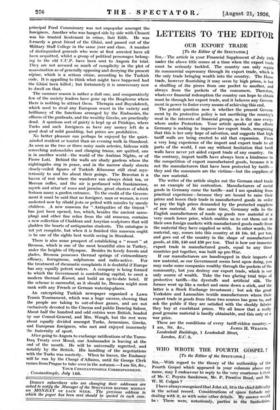LETTERS TO THE EDITOR
OUR EXPORT TRADE
[To the Editor of the SPECTATOR.] SIR,—The article in your Financial Supplement of July 24th under the above title comes at a time when the export trade must be seriously tackled. The country can only regain its commercial supremacy through its export trade, which is the only trade bringing wealth into the country. The Home tnade, however flourishing it may seem by high prices, is but a shuffling of the pieces from one pocket to another, and always from the pockets of the consumers. Therefore, whatever financial redemption the country can hope to obtain must be through her export trade, and it behoves any Govern. ment in power to foster every means of achieving this end.
The potent question now is whether the present Govern. ment by its protective policy is not sacrificing the country's weal in the interests of financial groups, as is the case every- where under Protection. Your article speaks of the efforts Germany is making to improve her export trade, recognizing that this is her only hope of salvation, and suggests that high tariff walls are being erected to aid that expansion. From a very long experience of the import and export trade to all parts of the world, I can say without hesitation that tariff walls have never yet aided export trade of any country. On the contrary, import tariffs have always been a hindrance to the competition of export manufactured goods, because it is not the manufacturers that have been protected by tariffs— they and the consumers are the victims—but the suppliers ol the raw material.
The writer of the article singles out the German steel trade as an example of his contention. Manufacturers of metal goods in Germany curse the tariffs—and I am speaking from practical experience—because they are bound to raise their prices and lessen their trade in manufactured goods in order to pay the high prices demanded by the protected suppliers of raw material. At the same time, Germany sells to the English manufacturers of made up goods raw material at a very much lower price, which enables us to cut them out in their own foreign markets with manufactured goods made from the material they have supplied us with. In other words, the material, say, comes into this country at 28 10s. Od. per ton, and goes out of the country in the, shape of manufactured goods, at 230, 240 and 250 per ton. That is how our immense export trade in manufactured goods, equal to any three countries put together, was built up pre-War.
If our manufacturers are handicapped in their imports of raw material, as our Government seems bent upon doing, you may make some companies wealthy through the pockets of the community, but you destroy our export trade, which is our only source of wealth. Take the two 'glaring -trial trips of protective tariffs—the dyestuffs and artificial silk. The former went up like a rocket and came down a stick, and the latter is a Stock Exchange investment ; but ask the great Yorkshire and Lancashire textile manufacturers where their export trade in goods from these two sources has gone to, and ask the public if they are satisfied with the shoddy fabrics they buy at exorbitant prices. We all know that a really good genuine material is hardly obtainable, and this only at a war price.
These are the conditions of every tariff-ridden country.—


































 Previous page
Previous page